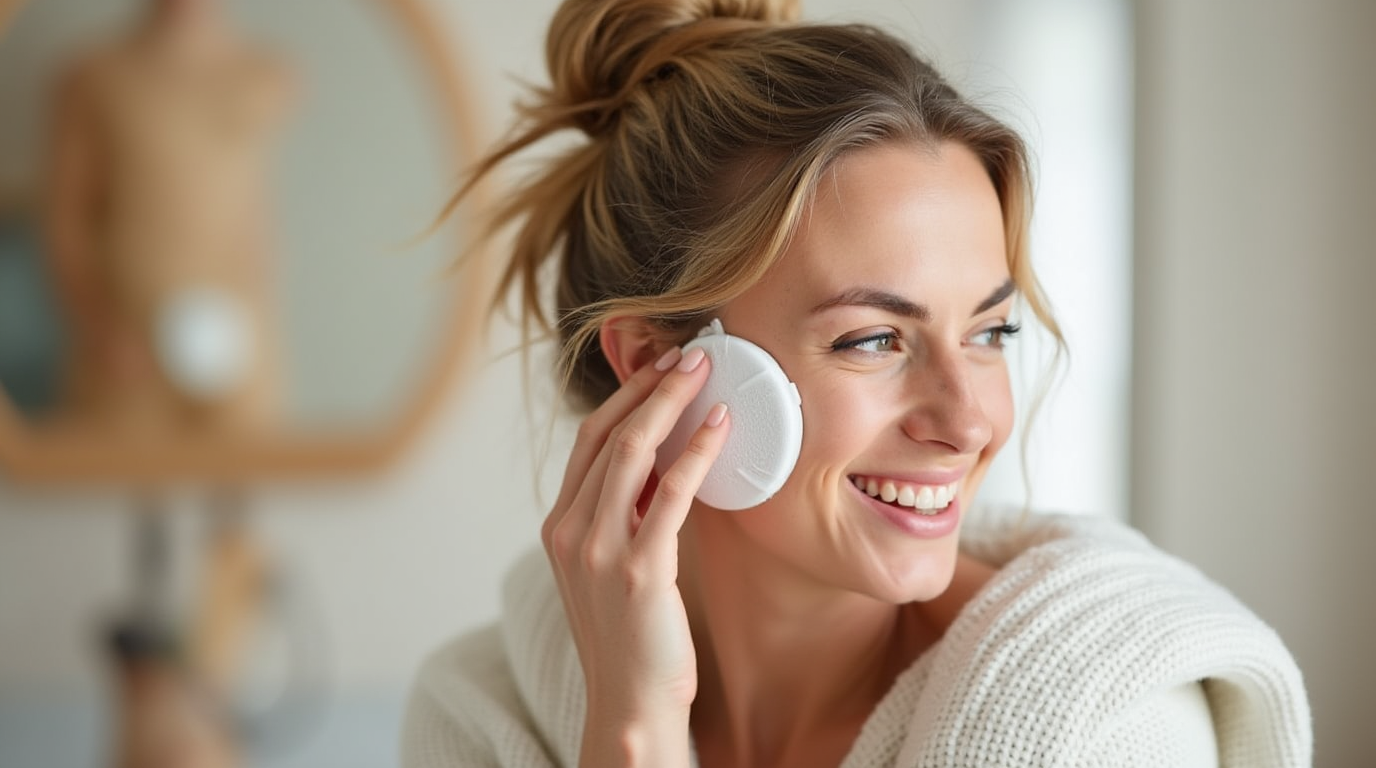Evening Self care Routines
Imagine the day’s chaos fading as dusk falls. Your phone buzzes, deadlines loom, and your mind whirls. Now, picture hitting pause. What if those last hours before bed could be a soothing hug, not a frantic rush? That’s the beauty of evening self care. https://naturalnicehealth.com/category/care-ideas/
Remember the last time you truly focused on yourself at night? It might have been a warm bath, deep breathing, or just stepping away from screens. These moments are not just treats—they’re essential. In a world that values hustle, your evenings can recharge you, clear your mind, and prepare you for tomorrow.
Table of Contents
Why Evening Self Care Matters for Your Wellbeing
Evening self-care is more than a luxury; it’s backed by science to boost your health. By focusing on self-care before sleep, you support your body’s recharge. Discover why these moments are crucial and how small steps can make a big difference.

The Science Behind Effective Evening Routines
Our bodies have natural cycles called circadian rhythms. By doing self-care tips like dimming lights or gentle stretches, you tell your brain it’s time to relax. Studies show that aligning with these rhythms can enhance sleep quality and boost energy for the next day.
How Evening Self Care Impacts Sleep Quality
Activities like reading or calming music help lower stress hormones. Here’s how they work:
- Screen-free time boosts melatonin, the sleep hormone
- Relaxing activities lower heart rate and anxiety
- Consistent routines train your brain to recognize bedtime cues
Benefits of Consistent Nighttime Practices
Over time, evening routines do more than just improve sleep. You might see:
- Sharper focus during the day
- Better mood management
- Stronger immunity and physical recovery
Small steps like these turn how to take better care of yourself into a habit. This habit builds resilience and joy. Your evenings prepare you for a healthier tomorrow.
Creating Your Personal Evening Wellness Sanctuary
Your evening wellness starts with a special space. It’s where you recharge your mind and body. Turn a corner of your home into a calm sanctuary each night.
Start by clearing clutter to clear your mind. Soft string lights or a salt lamp add a warm glow. Add a plush throw or textured rug for comfort. Plants like peace lilies or trailing ivy bring life and oxygen.
Make this space free from distractions. Set rules like no emails or TV. Follow these steps to create your haven:
- Swap bright overhead lights for candlelight or table lamps
- Hang blackout curtains to control ambient light
- Display items that inspire peace, like seashells or framed quotes
Engage all senses with these elements:
| Sense | Idea |
|---|---|
| Sound | Wind chimes, rain sounds app, or a meditation playlist |
| Smell | Essential oils (lavender, sandalwood) in a diffuser |
| Touch | Velvet pillows, weighted blanket, or smooth river stones |
| Sight | Neutral colors like sage green or muted blues on walls |
| Taste | Keep a thermos of mint tea within reach |
Your sanctuary evolves with you. Reassess it every month to keep it nourishing. Small changes keep your practice fresh and meaningful.
Essential Components of a Restorative Evening Routine
A restorative evening routine is simple. It should match your natural rhythms to improve sleep and calm your mind. Find a self-care routine that fits your energy and schedule. These steps help your body recharge.
Timeframes: When to Start Winding Down
Your body’s sleep pressure grows in the evening. Start winding down 1–2 hours before bed. For example, if you want to sleep by 10 PM, start slowing down by 8 or 9 PM. This allows for calming activities like reading or stretching without screens.
Customizing Routines for Different Energy Levels
High-energy days need active yet calming choices. Try a post-workout walk or gentle yoga. On low-energy days, choose restful activities like reading or herbal tea. Your routine should adjust to your mood but keep screen-free time.
Adaptinging Your Routine for Weekdays vs Weekends
Weekdays might have a strict bedtime routine, like a 8 PM skincare routine and reading. Weekends offer more flexibility—enjoy a longer bath or journaling. But always avoid screens before bed. Consistency in core steps is key, even with schedule changes.
Try these templates to start your plan:
- 10-Mins: 5 mins of reading, 5 mins of deep breathing.
- 30 Mins: Warm bath, journaling, light snack.
- 60 Mins: Gentle yoga, skincare, meditation, bedtime reading.
Adjust these examples to fit your preferences. But keep winding down intentional and consistent.
Digital Detox: Disconnecting for Better Rest
Smartphones and tablets glow softly in your hands long after the sun sets. But those screens emit blue light that tricks your brain into staying awake. Cutting back on tech before bed isn’t about perfection—it’s about small shifts that improve sleep. Start by setting a device curfew. Choose an hour like 9 PM and move all screens out of your bedroom. Apps like Screen Time or Digital Wellbeing can block social media and track usage.
Try the 30-60-90 rule: 30 minutes before bed, switch to reading a book. 60 minutes earlier, mute non-urgent notifications. 90 minutes before sleep, replace scrolling with deep breathing or a warm shower—proven relaxation techniques. If FOMO creeps in, remind yourself that checking emails late at night adds stress.
- Create phone-free zones: Keep devices out of the bedroom entirely.
- Use blue light filters built into phones after sunset.
- Replace doomscrolling with activities like journaling or stretching—simple self care advice that nurtures calm.
Your evening self care deserves space away from screens. Small steps like these turn bedtime into a tech-free sanctuary. Remember, the goal isn’t to eliminate devices but to design a restful transition to sleep. Your mind—and tomorrow’s energy—will thank you.
Mindfulness Exercises to Quiet Your Evening Mind
Evening wellness starts with calming your mind. Mindfulness exercises help you focus on inner peace. They make meditation and journaling great for unwinding. Even short sessions can help you relax and prepare for sleep.
Five-Minute Meditation Practices
Start with guided mindfulness exercises that only take five minutes. Try these:
- Body scan meditation: Close your eyes and scan your body from toes to head. Notice sensations without judgment.
- Gratitude reflection: Think of three things that made you happy that day. This boosts positive thoughts before bed.
- Progressive relaxation: Tense and then release each muscle group, starting with your feet and moving up.
Breathing Techniques for Evening Calm
Controlled breathing helps you relax:
- 4-7-8 method: Breathe in for 4 seconds, hold for 7, then breathe out for 8. Repeat 3-4 times.
- Box breathing: Breathe in, hold, breathe out, and hold again for 4 counts. This forms a “box” pattern.
- Alternate nostril breathing: Use your fingers to alternate nostrils while breathing deeply.
Journaling Prompts for Mental Release
Unwind by answering these questions:
- What small victory felt meaningful today?
- What can I release to feel lighter tonight?
- What’s one thing I’m looking forward to tomorrow?
These self-care practices don’t need to be perfect. Just be consistent. Even brief mindfulness exercises can anchor your evening routine. They help you find clarity and rest.
Soothing Bath Rituals for Ultimate Relaxation
Take a warm bath to relax and get ready for sleep. The best water is 98–100°F, taken 1–2 hours before bed. This helps lower your body temperature. Add a cozy bath outfit like a plush towel and soft robe to make your bathroom a sanctuary.
- Epsom salts to ease muscle aches
- Lavender or chamomile essential oils to calm nerves
- Dead sea salts for skin renewal
Try these DIY blends tailored to your needs:
| Blend Name | Ingredients | Benefits |
|---|---|---|
| Peaceful Nights | 1/2 cup Epsom salts + 10 drops lavender oil | Reduces anxiety, promotes sleep |
| Refresh Renew | 1/4 cup oatmeal + 5 drops lemon balm oil | Softens skin, boosts mood |
| Deep Relax | 10 drops ylang-ylang oil + 1/4 cup baking soda | Reduces stress hormones |
No bathtub? Try warm foot soaks or a steamy shower meditation. Clean your face, moisturize, and put on your bath outfit. This turns your night into a self care routine that refreshes your body and mind.
Nourishing Your Body: Evening Nutrition and Hydration
Your evening choices shape how you rest. Small tweaks to what you eat and drink can boost your evening self care and make self-care before sleep easier. Follow this self care advice to fuel relaxation without overdoing it.
Calming Teas and Beverages
| Tea Type | Key Compound | Benefits | Preparation |
|---|---|---|---|
| Chamomile | Apigenin | Calms nerves | Steep 5 mins |
| Valerian Root | Valerenic Acid | Encourages drowsiness | 1 tsp in hot water |
| Lavender | Lavandulyl acetate | Reduces stress | Brew 10 mins |
Drink these 1-2 hours before bed for best results.
Light Snacks That Support Sleep
- Warm almond milk: Contains calcium to relax muscles.
- Hard-boiled eggs: Protein-rich and easy to digest.
- Whole-grain toast with peanut butter: Fiber plus tryptophan.
- Edamame beans: Plant-based protein with magnesium.
Keep portions small to avoid bloating.
Foods to Avoid Before Bedtime
- Greasy pizza: Can cause heartburn.
- Sodas: Caffeine or sugar disrupt sleep cycles.
- Ice cream: High sugar delays melatonin release.
Swap heavy meals for a small banana (rich in potassium) instead.
Hydrate early—drink water 2 hours before bed. A sip before bed is fine if you’re thirsty. Small choices here make a big difference in your sleep quality.
Gentle Movement and Stretching Before Sleep
Ending your day with gentle movement is a top relaxation technique to ease tension. Whether you’ve been sitting or running errands, slow stretches help your body relax. These self-care practices are about listening to your body’s needs, not pushing limits.
- Neck rolls: Gently tilt your head side to side, then circle slowly, focusing on releasing tightness.
- Cat-cow stretch: On hands and knees, arch and flatten your back to loosen your spine.
- Seated forward fold: Sit with legs extended, hinge forward from your hips to stretch hamstrings.
- Child’s pose: Kneel on the floor, stretching arms forward to open your lower back.
Pair movements with deep breathing to enhance the winding down process. Options like qigong or slow yoga flows combine breath and motion for deeper relaxation. Even a 10-minute walk outdoors or dancing to calming music can signal to your mind it’s time to rest.
| Practice | Focus | Time |
|---|---|---|
| Slow yoga | Muscle release | 10–15 mins |
| Walking | Mental clarity | 15 mins |
| Qigong | Breath-movement sync | 5–10 mins |
Remember: Movements should feel soothing, not strenuous. If a stretch causes sharp pain, stop. Prioritize comfort—your evening routine is about nurturing, not perfecting.

Creating the Perfect Bedroom Environment
Your bedroom is key to a good bedtime routine. Making small changes can turn it into a peaceful haven. Adjust the temperature, lighting, and organization to help you sleep better and wake up feeling calm.
Optimal Temperature and Lighting
Keep your room cool, between 65–68°F (18–20°C), for better sleep. Choose breathable bedding like cotton or bamboo. Use blackout curtains or an eye mask to block outside light.
Switch to warm dim lamps an hour before bed. This tells your brain it’s time to relax.
Aromatherapy for Better Sleep
Use calming scents like lavender or chamomile to relax. Try these tips: spray linen with essential oils, use a diffuser on low, or place dried flowers under your pillow. But be careful if you’re sensitive to strong smells.
Organizing for Morning Success
End each evening with a 5-minute cleanup. Lay out tomorrow’s clothes and charge devices in another room. Clear the floor space. A tidy room helps you start the day with less stress.
Self Care Tips for High-Stress Days
Evening stress doesn’t have to ruin your self care plans. When days feel too much, simple self-care tips can help. First, figure out what kind of stress you’re feeling: mental, emotional, or physical. This helps you know what your body needs.
- Mental overload? Try changing tasks with easy self care ideas like doodling, organizing, or solving a quick puzzle. It helps shift your focus.
- Emotional overwhelm? Do a 2-minute body scan: just notice what you feel without judging. Apps like Insight Timer offer free guided sessions to calm your mind.
- Physical tension? Try child’s pose yoga stretches or use a foam roller on tight shoulders. These actions release stress without much effort.
Even 5 minutes can make a difference. Try these quick self care reset moves:
- Inhale lavender essential oil (3 breaths) to calm your nerves.
- Press thumb and index finger on your temples for 10 seconds to ease headaches.
- Place feet in a bowl of cold water to reset your focus.
Some nights, it’s okay to simplify. Skip non-essential activities like a long bath if you’re tired. Focus on actions that bring calm, even if they’re short. Your self care toolkit isn’t about being perfect. It’s about finding small steps that work for you today.
Seasonal Evening Self Care: February Self Care Practices and Beyond
Change your evening routines with the seasons. Winter is for cozy rituals, and spring is for renewal. Refresh your self care routines with these tips.
| Season | Focus | Practices |
|---|---|---|
| Winter | Cozy Comfort | Warm baths with lavender oil, reading by soft lights, or sipping herbal tea. For february self care, try candlelit journaling to recharge. |
| Spring | Renewal | Detox teas like dandelion, decluttering spaces, or setting intentions. A self care reset with morning light walks. |
| Summer | Cooling | Cool showers, hydrating with cucumber water, or evening strolls. Adjust bedtime to match longer days. |
| Fall | Grounding | Herbal baths with cinnamon, gratitude journaling, or cozy sweaters. Prep for winter’s inward |
Small changes can align your self care routines with nature. Try one new practice each season to keep your wellness journey fresh.

Conclusion: Building Consistency in Your Evening Self Care Journey
Building consistency in your evening self care isn’t about being perfect. It’s about making progress. Start with small steps, like a five-minute meditation or a warm cup of chamomile tea. Make these habits part of your daily routine.
For example, try deep breathing right after brushing your teeth. This makes new habits feel natural. Consistency grows when you adapt to life’s changes.
If work keeps you busy, simplify your routine. Swap a full bath for a quick face mask or use bedtime journaling. Embrace flexibility without feeling guilty. Track small wins with a simple checklist.
A 30-day plan can help you make lasting changes. Add one new practice each week, like swapping screens for a book. Celebrate even minor progress. Every consistent action strengthens your wellbeing.
Remember, evening self care isn’t a luxury. It’s the fuel that powers your resilience. When life gets hectic, return to basics. A five-minute stretch, a sip of herbal tea, or a single deep breath all count.
Over time, these choices become habits that shape a healthier you. Your evening routine is a canvas. Paint it with patience, and watch self care transform into a lifestyle. https://www.health.com/fatty-liver-disease-self-care-8704500
FAQ
Why is evening self care important?
Evening self care helps you relax after a busy day. It reduces stress and improves sleep. It also boosts your overall wellbeing. Taking time for self-care can make your days more productive.
What are some easy self care ideas for winding down?
Try mindfulness exercises, light stretching, or a calming bath. Herbal teas and light snacks can also help you relax. Pick activities that you enjoy and look forward to.
How can I create a cozy evening wellness space at home?
Make a cozy space by decluttering and adding soft lighting. Include plants and natural elements. Use soothing sounds, scents, and textures to make it relaxing.
What are some mindfulness exercises to practice at night?
Try guided meditations, 4-7-8 breathing, and journaling. Even a few minutes can help you relax.
How can I improve my sleep quality with nutrition?
Drink calming teas like chamomile and eat light snacks with tryptophan. Avoid heavy or spicy foods before bed. Stay hydrated but not too close to bedtime.
What strategies can help me disconnect from technology in the evening?
Set device curfews and make phone-free zones. Reduce screen time before bed. Replace digital activities with relaxing ones like reading.
How can I maintain consistency in my evening self-care routine?
Start with a 5-minute practice each night. Gradually add more to your routine. Tracking your progress can keep you motivated.
What are some seasonal evening self care practices for February?
In February, enjoy warm baths, herbal teas, and cozy indoor activities. Setting intentions for spring can also add to your winter routines.

